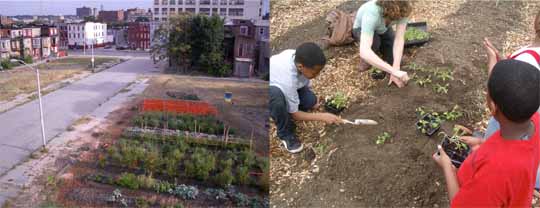
Description of P Park by: Scott Berzofsky
Participation Park is an ongoing public art project and activist initiative based on converting a vacant lot in east Baltimore into an urban farm, social space, community kitchen, radical planning studio, free store and adventure playground. Against the increasing privatization of public spaces in the city and the top-down forms of urban planning that design them, we are squatting the land and collaborating with neighborhood residents to produce a space that responds to our collective needs and desires. Inspired by movements to ‘reclaim the commons’ and demand a ‘right to the city,’ the park is an experiment in democratic spatial practice, inviting everyone who participates in the use of the space to engage in the political process of shaping it.
Read a short email conversation between Alyssa and Scott….
Continued
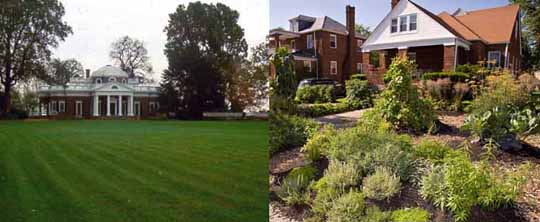
Edible Estates is a project created by artist and architect Fritz Haeg that involves traveling around the country converting front lawns into beautiful edible gardens. He started by asking the question, if Thomas Jefferson had planted his garden on the front lawn of Monticello, what would our lawns look like today? Haeg’s project has captured much enthusiasm from families who are challenging that "estate" mentality. The idealistic picture-perfect green space is an unfortunate inheritance of the seeds planted on the plantation lawns of our founding fathers. To Haeg, the front lawn is a waste of valuable resources and the locus of mounting concerns over the effects of pesticides on human health and surrounding ecosystems. What’s most interesting about Haeg’s project is one of the first in his series of gardens was planted on July 4th, 2005 in Salina, Kansas. Part of the Great Dust Bowl of the 1930’s, Salina is also home to The Land Institute . This organization has been working for more then 20 years to find ways to restore topsoil through perennials and polycultures. Haeg’s Edible Estates aren’t just a novel idea; they are a call to action for the right to know where our food is coming from and a patriotic move to restore our homeland.
The above picture is from an Edible Estate project started April 2008 in West Baltimore. Here’s an article from the Urbanite .
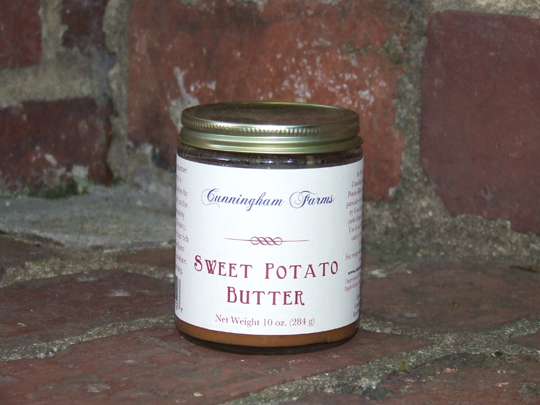
Cunningham Farms specializes in gourmet sweet potato butter made from organic potatoes and apple cider. It goes great with a variety of foods or their gourmet sweet potato pie. Cunningham Farms is a community oriented company that was founded with the socially responsible vision of providing jobs for families of low-income areas. The farm is also is a member of the Appalachian Spring Cooperative . Read more about their vision of social equity on their site.
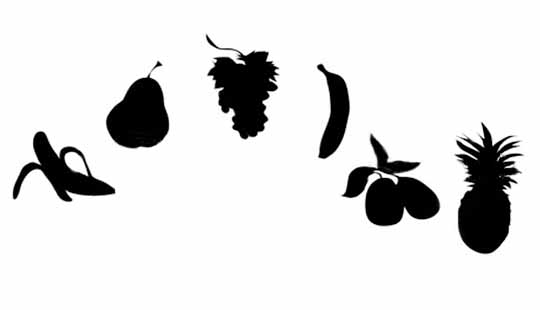
Maryland Online Farmers Market
is where you can buy, sell and trade locally grown food. Their website has a list of members that are able to post what they’re selling and how to connect. You’ll be able to find everything from eggs to okra.

One Straw Farm is the largest organic vegetable farm in Maryland and has been in operation since 1985. Located in White Hall of I-83 and a pit stop away from Heathcote Community in Freeland. The farm supplies families, restaurants and wholesalers with a seasonal collection of certified organic produce. You can receive produce individually through a member fee or visit over 30 different markets, grocers and restaurants in the Baltimore area including Mill Valley Garden Center and the Waverly Farmers Market. The farm has 750 members all of which are within a 50 mile radius. Their website has a helpful harvest chart which lists when and what produce will be available. There’s a great article in Baltimore Eats, November 2008 Vol 3-#11, about how Drew and Joan Norman got One Straw started.
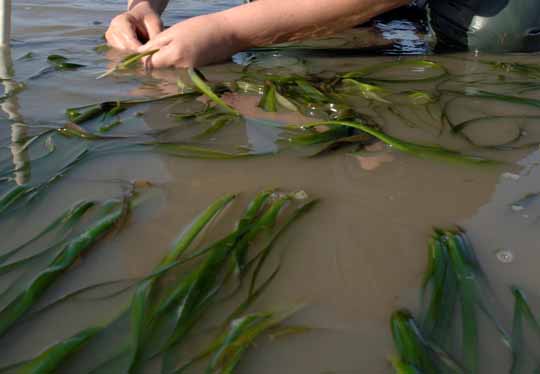
Bay Organics , located in Dorchester County, offers a unique composting process through nutrient-rich soil enhancement products that aid in healthy cultivation for agricultural purposes. One primary focus is to assure pesticide free and environmentally friendly waste disposal from agribusinesses on the eastern shore. Through this work, their unique composting methods, and decades long experience in the soil and mulch industry, offer some of the richest and environmentally friendly soil in the region. Check out their Bay Organics T-shirts. Proceeds go to preserve the health and natural ecology of the bay.

South Mountain Creamery is a nationally recognized family-owned farm in Maryland, serving quality milk and dairy products. Most importantly, they promote an environmental health-conscious vision of food production. They use no hormones or antibiotics on any of their cows and encourage recycling of their glass bottles, sparing unnecessary landfill space. Using glass bottles not only maintains quality taste but also minimizes toxic residue seepage from cardboard or plastic. Come down and see the farm in Middletown firsthand; they welcome observation and assistance in milking and calf-feeding!



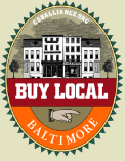


 View the dynamic, moving GOforChange: Greening Baltimore video
View the dynamic, moving GOforChange: Greening Baltimore video






